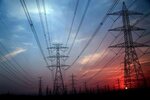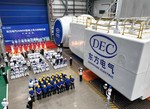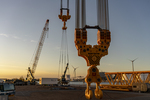News Release from American Clean Power Association (ACP)
Wind Industry Profile of
06/09/2011
AWEA - Frum errs on wind energy's cost
Conservative activist David Frum repeated some misconceptions about wind power in a commentary that aired recently on American Public Media's "Marketplace" radio program, in which he criticized Germany's decision to phase out nuclear power. Contrary to Mr. Frum's comments:
- Wind energy is one of the most affordable forms of new electric generating capacity, competing with all other sources of new capacity and saving consumers money by holding down the cost of other fuels such as natural gas. Furthermore, since a wind turbine's fuel (the wind) is free throughout the 20-year life span of a wind farm, wind power is inflation proof and protects consumers from fuel price spikes.
- Germany's wind resource, both land-based and offshore, is domestic, helping to reduce dependence on imports of natural gas from Russia.
- The cost of generating electricity wind energy is typically higher in Europe than in the U.S., partly because average wind speeds are lower, making wind farms less productive. However, this is offset by the fact that European electricity prices are also higher--in order to reduce dependence on imported fuel, European governments tax energy more to encourage energy efficiency.
- As Germany's offshore wind turbines industry develops, a large "supply chain" of companies providing specialized turbine components and services (such as maintenance of large-scale equipment at sea) will be created, gaining a head start in supplying those same components and services in export markets. We have already seen this happen in land-based wind, where European companies now play a major role in the U.S. market. (For a thoughtful recent analysis of this phenomenon, see Elisabeth Rosenthal's excellent New York Times article "U.S. Is Falling Behind in the Business of Green." For the story of a German port city that is banking on offshore wind farm for economic development, see "German port's future blowing in the wind.")
For all of these reasons, a decision to increase reliance on wind power is likely to pay major dividends in the future for Germany, which is Europe's largest economy. Let's hope that American policymakers are watching closely.
By Tom Gray, www.awea.org/blog/
- Wind energy is one of the most affordable forms of new electric generating capacity, competing with all other sources of new capacity and saving consumers money by holding down the cost of other fuels such as natural gas. Furthermore, since a wind turbine's fuel (the wind) is free throughout the 20-year life span of a wind farm, wind power is inflation proof and protects consumers from fuel price spikes.
- Germany's wind resource, both land-based and offshore, is domestic, helping to reduce dependence on imports of natural gas from Russia.
- The cost of generating electricity wind energy is typically higher in Europe than in the U.S., partly because average wind speeds are lower, making wind farms less productive. However, this is offset by the fact that European electricity prices are also higher--in order to reduce dependence on imported fuel, European governments tax energy more to encourage energy efficiency.
- As Germany's offshore wind turbines industry develops, a large "supply chain" of companies providing specialized turbine components and services (such as maintenance of large-scale equipment at sea) will be created, gaining a head start in supplying those same components and services in export markets. We have already seen this happen in land-based wind, where European companies now play a major role in the U.S. market. (For a thoughtful recent analysis of this phenomenon, see Elisabeth Rosenthal's excellent New York Times article "U.S. Is Falling Behind in the Business of Green." For the story of a German port city that is banking on offshore wind farm for economic development, see "German port's future blowing in the wind.")
For all of these reasons, a decision to increase reliance on wind power is likely to pay major dividends in the future for Germany, which is Europe's largest economy. Let's hope that American policymakers are watching closely.
By Tom Gray, www.awea.org/blog/
- Source:
- American Wind Energy Association
- Author:
- Posted by Trevor Sievert, Online Editorial Journalist / By Tom Gray
- Email:
- windmail@awea.org
- Link:
- www.awea.org/...
- Keywords:
- awea, wind, wind energy, wind turbine, rotorblade, awea, ewea, wind power, suppliers, manufacturers, renewable energy, trevor sievert
All news from American Clean Power Association (ACP)
news in archive
Related News
China, Brazil Partnership
11/21/2024


























